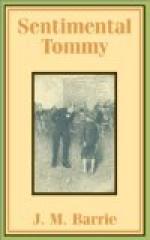The first-known face our three met was Corp. He was only able to sign to them, because Californy’s specialty had already done its work and glued his teeth together. He was off to the smithy to be melted, but gave them to understand that though awkward it was glorious. Then came Birkie, who had sewn up the mouths of his pockets, all but a small slit in each, as a precaution against pickpockets, and was now at his own request being held upside down by the Haggerty-Taggertys on the chance that a halfpenny which had disappeared mysteriously might fall out. A more tragic figure was Francie Crabb (one and seven pence), who, like a mad, mad thing, had taken all his money to the fair at once. In ten minutes he had bought fourteen musical instruments.
Tommy and party had not yet reached the celebrated corner of the west town end where the stands began, but they were near it, and he stopped to give Grizel and Elspeth his final instructions: “(1) Keep your money in your purse, and your purse in your hand, and your hand in your pocket; (2) if you lose me, I’ll give Shovel’s whistle, and syne you maun squeeze and birse your way back to me.”
Now then, are you ready? Bang! They were in it. Strike up, ye fiddlers; drums, break; tooters, fifers, at it for your lives; trumpets, blow; bagpipes, skirl; music-boxes, all together now—Tommy has arrived.
Even before he had seen Thrums, except with his mother’s eye, Tommy knew that the wise begin the Muckley by measuring its extent. That the square and adjoining wynds would be crammed was a law of nature, but boyhood drew imaginary lines across the Roods, the west town end, the east town end, and the brae, and if the stands did not reach these there had been retrogression. Tommy found all well in two quarters, got a nasty shock on the brae, but medicine for it in the Roods; on the whole, yelled a hundred children, by way of greeting to each other, a better Muckley than ever.
From those who loved them best, the more notable Muckleys got distinctive names for convenience of reference. As shall be ostentatiously shown in its place, there was a Muckley called (and by Corp Shiach, too) after Tommy, but this, his first, was dubbed Sewster’s Muckley, in honor of a seamstress who hanged herself that day in the Three-cornered Wood. Poor little sewster, she had known joyous Muckleys too, but now she was up in the Three-cornered Wood hanging herself, aged nineteen. I know nothing more of her, except that in her maiden days when she left the house her mother always came to the door to look proudly after her.
How to describe the scene, when owing to the throng a boy could only peer at it between legs or through the crook of a woman’s arm? Shovel would have run up ploughmen to get his bird’s-eye view, and he could have told Tommy what he saw, and Tommy could have made a picture of it in his mind, every figure ten feet high. But perhaps to be lost in it was best. You had but to dive and come up anywhere to find something amazing; you fell over a box of jumping-jacks into a new world.




